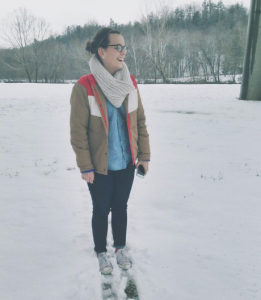Freeing Slaves Spotlight: An Interview with Nerissa Hatter of A 2nd Cup
Today, VJN interviewed Nerissa Hatter of A 2nd Cup to dialogue about human trafficking in the Houston, Texas area and what a local non-profit coffee shop in doing to free slaves. To begin we have asked Nerissa to introduce herself and what A 2nd Cup is.

How did you become involved with this organization?
When I was getting ready to graduate last May from Liberty University with a B.S. in Psychology, I knew I wanted to get involved in something… important. I wanted to gain experience. I was looking up Anti-Trafficking organizations in Houston (by happen-stance!) and I came across the A 2nd Cup website. After I read their mission and vision I was 100% sold – I had just told a friend only a few days before I wanted to open up a coffee shop that partnered with local organizations and churches for the sake of survivors. I got in contact with Erica Raggett, A 2nd Cup’s founder, and ended up moving to Houston in the beginning of July 2015 to take a job as the Manager of Anti-Trafficking Initiatives! I think I got the position I had for a couple of reasons: there was an obvious passion I have for social justice issues – for the vulnerable. That was only amplified as I had more and more conversations with the founder, Erica Raggett. I think that’s why she took a risk on me! As far as managing people, I think that came with my simple love for people and my experience as an RA at Liberty. Managing people had been my job – both literally and figuratively – for a couple years. As a brand new grad, with no professional, “real world,” experience I am pretty sure those two reasons are why Erica thought I would be a good fit. I was pretty fortunate to work for someone who cared far less about my experience and my previous knowledge of Human Trafficking and a whole lot more about my potential as a person. Truly, I think that’s what gave me the passion I had to learn and do a job well done!
Can you tell me about the work your organization does and the organizations you work directly with?
A 2nd Cup, being a non-profit coffee shop that seeks to end Human Trafficking in Houston (which is one of the greatest trafficking hubs in America) has a threefold purpose – being a place for awareness and education that is open and available to the community, to be a “hub” and a meeting point for all other organizations (both from the private and public sector) to collaborate, and to make as much money as we can to provide aftercare resources for survivors of human trafficking (mentoring, tutoring, job skills training, etc.) As a coffee shop and a business, there is a unique capacity and ability to connect with the general public allowing them the opportunity to be made aware of human trafficking when, unless they sought it, they would not have received that information.
We work with all kinds of other organizations. We firmly believe that the only way to combat Human Trafficking is for all of the organizations and their particular skills to come together – to avoid recreating the wheel. There is a place for law enforcement, faith based organizations, secular groups, educational facilities, etc. We have many strategic local partnerships, a couple are: Redeemed Ministries, Freedom Place, Sojourn Landing, Elijah Rising, and United Against Human Trafficking.
What have you learned about why Houston is such a hub for human trafficking?
Houston is a hotspot for a lot of reasons – the main three are these: First, geographically, they are positioned close to the border, have a major port, have an international airport, and they have one of the major highways that travels through the U.S. and that many truckers and travelers drive (I-10) that goes directly through the city. Second, Houston houses a lot of major events that spike up the trafficking by quite a bit like the super bowl (happening there this year and anti-trafficking organizations have been working with the city officials in how to prevent a rise in trafficking for many months now), major oil and gas conferences that bring in thousands of business men, and other sporting events and entertainment (i.e. concerts). Third, Houston is one of the most diverse cities in the nation. With that, it is very easy for a victim who has been trafficked internationally to fit in. It is not uncommon to walk down the street and see many other ethnicities speaking different languages around you. Whereas, in a rural area of Kentucky, hearing someone speaking a different language may perk an ear far more than it ever would in Houston.
What results does your organization achieve? How has your program improved over time?
A 2nd Cup has been a 501(c)(3) non-profit for about 5 years operating out of a temporary space just a couple of nights a week, doing as many events as they had the capacity for, and networking with the organizations in Houston. In October of 2015 we opened up a full time, permanent coffee shop! Our space includes enough information to educate a customer and a large separate area that is used for events, documentary screenings, panel discussions, collaborative meetings, and our after care programs. We want to provide resources for where the gaps exist which we’ve discovered is the process of reintegrating survivors into normal life and helping them get “back up on their feet,” so to speak. That is where we are putting all of our efforts – aftercare for survivors. However, that begins by gathering everyone who is fighting trafficking in one way or another in order to figure out what is being duplicated and where the gaps are – that’s where A 2nd Cup is right now.
What are your goals for the next three to five years? What priorities will help you achieve them? What barriers are in your way?
Mentioned in the previous question slightly – our goal is to begin implementing after care resources for survivors. In three year’s time, we’re hoping to be recognized as a resource for other organizations to refer survivors to in order to help them reintegrate into society. Because this is one of the greatest needs in the anti-trafficking efforts in Houston, there are very few barriers. The quicker we’re able to have strategic meetings with everyone in the fight, the quicker we’ll be able to join all the forces together and determine what the specific needs are. Once this happens, we will seek to fulfill those needs to the best of our ability.
What proportion of the company’s income goes directly to human trafficking rescue organizations?
100%. Apart from sustaining the business, all profits go directly towards survivor care either by supporting our partners that do survivor care or by funding the efforts A 2nd Cup will do in the aftercare realm mentioned above.
What is one story of a survivor you can share, and how did they end up in Houston?
I can’t think of a particular story I was made aware of about a girl getting trafficked and ending up in Houston. I think, contrary to popular belief, trafficking is very much a domestic problem as it is an international problem. I just described above why Houston is such a hub and explained all of the extra vulnerabilities that most cities don’t posses. However, the amount of victims that get trafficked in Houston who were born and raised in Houston – Americans through and through – is staggering. If I remember correctly, I’ve heard of a victim who has been in one of the local safe homes who was born and raised in a suburb of Houston. However, domestic or international, they all start the same – a vulnerable boy or girl and lots of empty promises of love, luxury, money, etc. The name of the trafficking game is about manipulation. Victims who are not from Houston who have been trafficked there have come from a place where someone promised them a better life, more money to provide for their family, etc.
What are some practical strategies the general public can use to help put an end to human trafficking?
It takes absolutely everyone doing what they are already doing. If you’re a teacher, then teach your students about vulnerabilities, the reality of trafficking, and ways to guard themselves; if you’re a stay at home mom, write letters to legislation; if you’re a doctor, train your fellow doctors in what to look for in a potential victim and be aware of resources for when you encounter one; purchase things that are fair trade; volunteer for a local non-profit that is combatting trafficking; educate your friends and family; learn what is happening in your city and where trafficking is most heavily found; commit to educating yourself. There’s a role for everyone to play but it can only begin with awareness and conversation. Trafficking exists everywhere, in each city and suburb, and the quicker we’re willing to have the hard conversations the quicker human trafficking will be abolished.
What resources do you have to help an individual who reaches out to you looking to be rescued?
Because of our close partnerships with organizations, we use them as resources depending upon the particular need of the individual that is seeking help. Depending upon the risk level of the survivor, there is a particular resource for them. We recognize and value that we don’t have the tools, resources, training, or capacity to fulfill every need a survivor may have; however, when everyone is working together for the same goal, there is someone who can be of assistance in every step of the way.
About the Author 
Having just graduated from Liberty University in Lynchburg, VA with a B.S. in Psychology, Nerissa Hatter ventured down to Houston, TX to join the efforts of A 2nd Cup – a non-profit coffee shop fighting human trafficking. She had never heard of a concept like the one A 2nd Cup has and thought it was a unique opportunity to combine her love for coffee and her passion for fighting social justice issues. In the Spring of 2016, after being in Houston just shy of a year, Nerissa got an opportunity to return to Liberty University as a Resident Director in order to pursue her M.A. in Crisis Counseling & Trauma care. Though she doesn’t miss the hot Texas summers, she’s hoping to return to the Houston area after she completes her degree.
